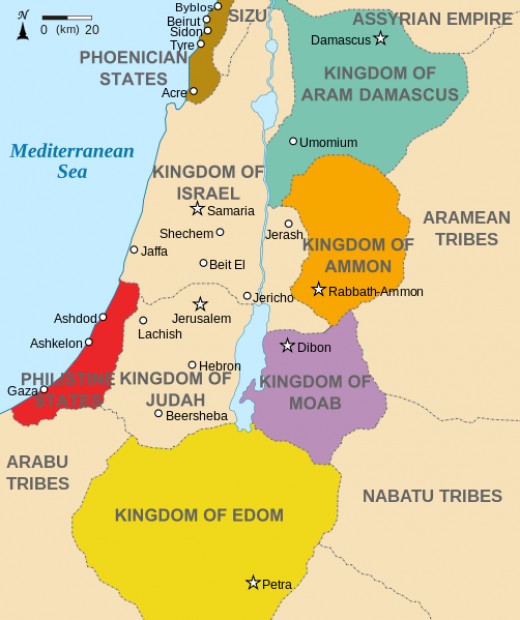The fall of Samaria, Israel’s capital, took place in 721 BC. Israel has become the province of Assyria, and Judah has preserved its independence, but it had to pay to the Assyrians huge tax.
Hezekiah (715-697 BC) continued with policy of paying tax to Assyria, but he tried to gain as bigger political and religious autonomy as he could. Hezekiah started with reforming the religion of the Jews. The prophet Isaiah was one of his advisors. The first thing he did was an attempt to centralize the cult in Jerusalem. He banned the local cults and shrines dedicated to Yahweh.
In 705 BC, Hezekiah raised rebel against Assyria.
Sennacherib was a ruler of the Assyria at that time. Hezekiah was resisting paying taxes. During this period in Assyria were many rebels, the largest of which was in Babylon. Sennacherib turned to Judah in 701 BC. The rebellion was crushed, Hezekiah had to pay a great tax, but Judah continued to be independent.
Hezekiah’s son Manasseh (697-642 BC) succeeded Hezekiah on the throne. The Kingdom has been reduced, impoverished, and desolate because of Assyria deportation of the population. Manasseh was taught by his father’s experience, so he did not make a rebellion against Assyria. He also restored the altars that his father destroyed, and in that way he was departed from the cult practices. That is the reason why the Old Testament tradition accuses him of the latter destruction of Judea and Jerusalem, but sources do not talk about internal unrest during his reign.



Amon (642-640 BC) succeeded Manasseh. He ruled briefly because he was killed in the 640 BC. On the throne was brought his eight-year-old son Josiah (640 – 609). Josiah was one of the most important rulers of Judea and events during his reign were crucial for development and formulation of the Old Testament tradition. Following its rules, Josiah centralized worshiping of Yahweh in the Temple, in Jerusalem. All other altars in Judea were destroyed. Priests that would fight against regime were persecuted from Jerusalem. Josiah’s program of centralization concentrated economic and political power in Jerusalem, which was in the spirit of his desire for the restoration of David‘s country. During his reign, Deuteronomy history was shaped.
Josiah golden age of Judah did not lasted for long time. In an effort to prevent Necho II to join the Assyrian forces in northern Syria, Josiah met with Egyptian ruler in Megiddo. The meeting Josiah did not survived, and the circumstances in which he died were not recorded.
After his murder, the throne was succeeded Josiah’s younger son Joakim also Jehoiakim (609-598 BC). Joakim was forced to concede superiority of Nebuchadnezzar II. After the failure of Babylon in Egypt in 601 BC, Judah has ceased to fulfill its vassal obligations. Shortly after that, in 598 BC Joakim died. Nebuchadnezzar II the same year took Jerusalem and he deported to Babylon Joakim’s successor Johan’s. On the throne came Joakim’s cousin Zedekiah.
After 10 years being on the throne, in 587 BC Zedekiah raised a rebel against Babylon. Jerusalem was for the third time under siege. Next year the city was conquered. Many residents of Jerusalem and Judah were deported to Babylonia, and many have found refuge in Egypt. New deportation of the population was in 582 BC. Refugees were not treated cruelly. That population eventually adopted Babylonian culture and religion. After the conquest of Babylonia in 539/8 BC Cyrus II allowed to the refugees to return in to their country. However, the return has started only two decades later and took place in two waves.
